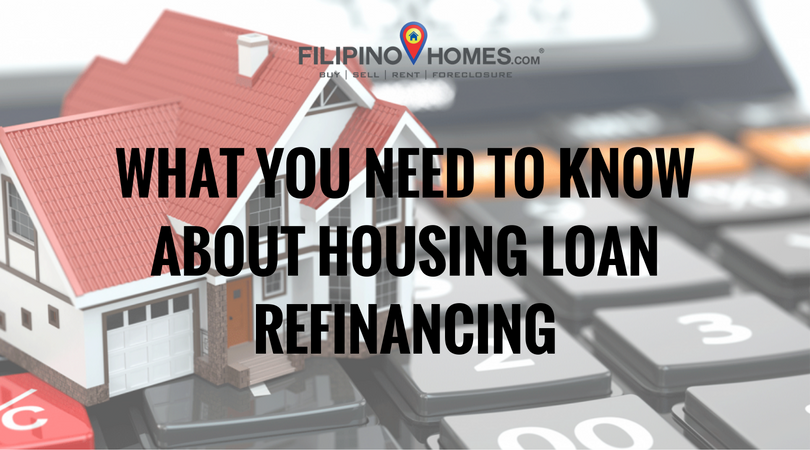
Housing Loan Refinancing is the process of paying off an existing home loan with a new loan. This means borrowing new money with a current interest rate that is lower than the rate of the loan being refinanced. Through refinancing, you obtain a loan that features terms and rates that are more favorable than your prior loan, for the purpose of easing your monthly and overall total payment. It is a financial option not always utilized in the Philippine but it is possible, and available. This is particularly true for housing loan refinancing, which many do not recognize as the effective means to improved finances that it is.
Reasons for Housing Loan Refinancing
- Switch to Different Loan Program
Some loans feature a viable rate, which is interest rate that fluctuates based on market conditions. While the benchmark that your currently loan is set up with cannot be changed, refinancing allows you to pay it off in full with a loan that features a fixed interest rate, effectively providing you a changed loan and payment program. - Lengthen Loan Period
While getting a loan with a longer tenor is not recommended since it incurs a larger total interest, this is often what is done when one wants to have to make lower monthly payments. Through refinancing, the payments can be spread out over a longer term, effectively making them smaller for each month. - Acquire financing for other expenses
A real property commonly increases in value over time. It is through this increased valuation that your new loan will be based on, which because of the home’s increased value, will be higher than the old loan. You then subsequently use it to refinance said old loan, with the remainder free for you to utilize on other expenses or investments.
Housing Loan Refinancing Factors to Consider
- The fixed interest rate is not fixed for the entire loan
For most lenders, the initial fixed rate lasts the first year, which is then subject to yearly repricing afterwards. There are lenders who provide refinancing loans that have longer initial fixed rate periods, as well as those that offer some form of rate protection where interest only increases to a certain ceiling. This is where research and negotiating is paramount, to ensure you get the best available interest rate for the longest possible time. - Moving cost
This refers to the expenditures you will make when you initiate a refinance. These include funding for the valuation of your property, legal fees, and disbursement and stamp duties. - Lock-in period
Most home loan refinancing packages come with a lock-in period, which often lasts a couple of years. This should pose no problem if you do not end up wanting to exit from your refinancing package within the said period. However, if you do, keep in mind that exit penalties can be quite hefty.
Like many financial transactions, housing loan refinancing is complex and requires due diligence on the part of the homeowners. Apart from seeking the most favorable interest rates and terms, it is paramount to make as much comparisons among refinancing deals. It is also recommended to work with a financial broker to get a better understanding of the options you have, and be assisted with the negotiations should you find a refinancing program that works for you and your finances. However, a reputable lender can provide quick answers to some of your concerns and help you make the important decision as to whether refinancing is right for you.




